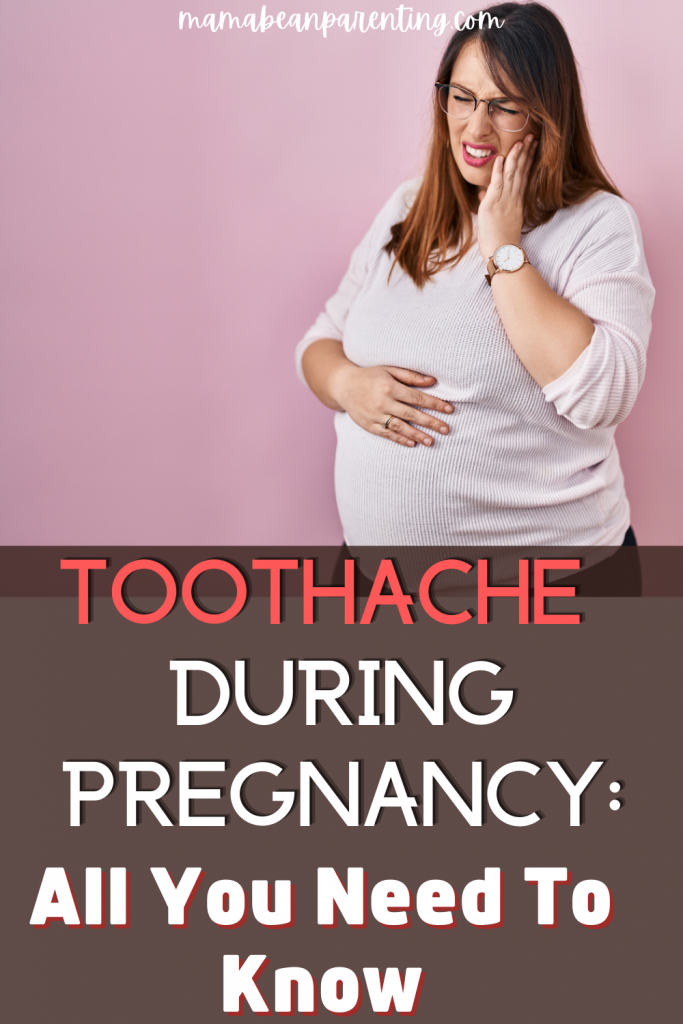Despite all the joys of pregnancy, mothers-to-be experience a lot of physical discomforts and emotional oscillations. From back pain to fatigue, the body endures a lot of stress, but it’s not uncommon for women to experience toothache during pregnancy, as well.
For many pregnant women, this journey gets very stressful. Without a doubt you have many questions. Is pregnancy connected with tooth pain? What are the causes and the symptoms? We’re here to provide an all-in-one guide to help you address the issue.
Keeping yourself physically and mentally healthy means that you’re also looking after your baby.
When it comes to toothache during pregnancy, it’s better to prevent than to treat, since toothache during pregnancy often points to more complex underlying issues.
Taking all the safety measures saves you a lot of headache later on. Still, if you’re here, it likely means that you’re already experiencing tooth pain. Before we start exploring potential treatment options, it’s important that we first analyze the actual causes.
Causes of Toothache During Pregnancy

The best way to prevent toothache while you’re pregnant is to maintain healthy dental habits and getting regular dental checkups. But, what if you have tooth pain anyway?
Although there a few potential causes of toothache during pregnancy, hormonal changes are the most common cause. How does it happen? Well, hormonal changes increase blood flow, which causes your gums to become more sensitive, which then leads to discomfort.
Aside from hormonal changes, morning sickness can cause vomiting and gastric reflux. Since the contents of the stomach are acidic, morning sickness can often lead to dental erosion, which increases the risk of tooth decay as the acid dissolves tooth enamel.
Tooth pain doesn’t necessarily have to be linked with pregnancy; the cause could, in fact, be as simple and as straightforward as poor dental hygiene. So, for a moment consider how you have been maintaining and improving the health of your teeth and your gums.
Toothache during pregnancy can also indicate pregnancy tumors. Don’t let the term itself put you off, because we’re talking about hemorrhagic swellings. They occur often in the gum tissues of pregnant women, but the key takeaway is that they’re not cancerous.
Other than that, a lot of moms-to-be experience gingivitis, which is basically a mild form of gum disease. Aggravated by hormonal changes, gingivitis occurs when gums become red and swollen. Bleeding may follow as a result of a plaque build-up on your teeth.
Stress and poor sleep habits are also known to trigger bruxism, otherwise known as teeth grinding. What bruxism basically implies is clenching or grinding your teeth while you’re asleep, but it is not at all unusual for pregnant women to experience awake bruxism, too.
Now, while these causes may perhaps be the most prevalent reasons why pregnant women experience discomfort in their teeth and gums, it could be something else entirely. For that reason precisely, make sure to schedule a dental appointment at first sign of discomfort.
The best solution is always going to be consulting a dentist or a medical professional.
Many people make the mistake of waiting before going for a checkup. Take your health seriously. Practice proper care and hygiene and never postpone your medical checkups.
Before we move on, let’s review the most common causes of toothache during pregnancy:
- Hormonal changes.
- Morning sickness.
- Pregnancy tumors (hemorrhagic swellings).
- Gingivitis.
- Bruxism.
- Poor dental hygiene.
- Other underlying issues.
Learning to Identify the Symptoms

Experiencing toothache during pregnancy differs from person to person.
Still, you’re bound to feel some, if not all, of the following symptoms.
The best way to get ahead of them is to seek proper dental treatment before the symptoms have a chance to worsen. That way you ensure the least amount of pain and discomfort.
The most prevalent symptom of toothache during pregnancy is pain. Since we all experience pain differently, the intensity varies. However, the pain you feel in your affected tooth can range from mild to moderate discomfort, to severe throbbing.
A toothache while you’re pregnant can also irritate the trigeminal nerve, which causes a migraine headache. So, if you feel your head pulsating, it likely indicates that the pain has gone untreated for too long, and that you need to seek medical care right away.
Another symptom of toothache during pregnancy is sensitivity. As your pregnant body increases its blood flow to support your growing baby, and with all the hormonal changes going on inside you, it’s possible for your teeth to suddenly become irritably sensitive.
This may make it painful to consume hot or cold food and drinks.
When inspecting your teeth, make sure to check your gums. Toothache during pregnancy can cause gum to become red and inflamed, and even swollen. Since being pregnant makes your gums more vulnerable to plaque, it’s not unusual for bleeding to take place.
Furthermore, an underlying infection, such as an abscess, could be the reason why you’re experiencing pain and discomfort. After all, swelling is often caused by an infection.
One of the signs of bruxism is a painful and uncomfortable sensation in your jaw.
Besides all the symptoms listed above, experiencing toothache during pregnancy has been known to cause ear pain, which is frequently wrongly attributed to an ear infection.
However, keep in mind that all of these symptoms may point to other conditions, as well.
If you notice any of these symptoms, it’s important that you consult with your dentist as soon as possible so that you may discover the cause and receive adequate treatment.
Treatment Options and Oral Care

Yes, a trip to the dentist will help you find adequate treatment, depending on the cause and severity of the issue. Still, it’s all about prevention. Maintaining good oral care and practicing good health habits is just as important as receiving professional care.
Here’s a few tips and self-care measures for you to practice:
- Brush your teeth at least two times a day. Make sure to maintain good oral care by flossing once a day. Flossing prevents plaque buildup and reduces the risk of cavities. Also, when brushing your teeth, it’s necessary that you brush your whole mouth
- Use the right toothpaste. The best option to protect teeth and fight plaque is a fluoride toothpaste, which also strengthens tooth enamel and makes it more resistant to decay.
- We know mothers-to-be have sugary cravings, but if you want to avoid toothache during pregnancy, avoid sugary and acidic foods, or at least lower your consumption.
- Schedule regular checkups with your dentist.
- Maintain a healthy diet. Stay hydrated. Increase the amount of water you drink.
- If you haven’t already, quit smoking. Smoking not only increases the chance of gum disease, but causes tissue damage in your baby, especially in the lung and the brain.
By practicing regular dental hygiene, you lower the risks of experiencing toothache while you’re pregnant and contribute to your overall health and the health of your baby, too.
However, if you start to feel unbearable tooth pain while you’re pregnant, it’s important that you consult with a healthcare professional as soon as possible. In fact, the moment you spot any of the symptoms, you would be wise not to delay your visit to the dentist.
A professional will help you find adequate treatment, which may include:
- Medical guidance, checkups and efficient treatments.
- Over-the-counter medicine, especially pain relievers. Make sure to consult with a medical professional before taking any medications when you have a baby on the way.
- Depending on the issue, you may have to undergo dental procedures. This may include fillings, root canals and extractions, all of which are safe for pregnant women.
Keep in mind that certain types of dental x-rays can be harmful to the developing fetus.
All self-measures and treatments aside, what can you actually do to lessen the pain when you’re stuck at home? Keep in mind that these methods are not solutions.
Yes, they can help you ease the discomfort to some extent, but you still need to consult your dentist.
With that in mind, here’s what you can try at home:
- Rinse your mouth with warm salt water. Salt water provides relief by reducing inflammation. Add a teaspoon of salt to a warm cup of water and swish the contents in your mouth a few times before spitting out. Practice two to four times a day.
- Especially if you’re experiencing headaches, jaw pain or ear pain, place a cold compress on the swollen area. An ice pack numbs the area and lessens the pain.
- Some oils, such as cloven oil and tea tree oil, have a pain-relieving effect. Soak a cotton ball in oil and gently massage the aggravated area for five to ten minutes.
Still, home treatments shouldn’t replace professional care. They exist to alleviate the pain temporarily, but you still have to see a dentist and find appropriate treatment.
In Conclusion

Mothers-to-be often experience toothache while pregnant.
Having investigated the common causes of what makes a tooth inflamed, it’s important to understand the symptoms.
As soon as you sense any pain, be it dull or sharp, be smart enough not to delay your trip to the dentist. Also, work on preventing rather than treating.
Consider your habits, too. Are you practicing healthy oral habits at home?
With the help of a dental professional, you will find adequate treatments, but it’s common for toothache while you’re pregnant to reoccur if you’re not taking all the necessary self-measures.
As a pregnant woman, you have to stay safe and mindful of what damages or improves your health.
Oral hygiene is a must for everyone, but it’s essential now due to the hormonal changes and fluctuations that are transpiring inside your changing body.
Practicing daily oral care allows you to enjoy this journey completely stress-free.

Mother of three and a primary school teacher. I’ve always loved being around children and helping them, so I chose my path as a teacher. It is sometimes hectic with three children, but I am 100 percent into it and wouldn’t change it for anything in the world.



When Does Teeth Sensitivity Start In Pregnancy? • Mama Bean Parenting
Thursday 16th of March 2023
[…] you have a toothache during pregnancy, and you’re wondering what the cause […]
Orajel 101: Is It Safe To Use Orajel While Pregnant? • Mama Bean Parenting
Wednesday 1st of February 2023
[…] many physical discomforts and emotional challenges, most expecting mothers happen to experience toothache during pregnancy. That’s why it’s important to stay informed as to what kind of medication and treatment […]